PUBH6000: Case Study - Social Determinants of Health for Sex Workers
VerifiedAdded on 2023/06/08
|7
|2175
|145
Case Study
AI Summary
This case study comprehensively examines the social determinants of health and their profound impact on the health and well-being of sex workers. It highlights how factors such as social acceptability, exclusion, stigmatization, discrimination, healthcare accessibility, and social support significantly influence both the physical and mental health of this population. The report uses the ecological model to analyze these determinants at intrapersonal, interpersonal, and community levels, revealing how societal attitudes, lack of support, and limited access to healthcare contribute to higher rates of communicable diseases, mental health issues, and violence among sex workers. The author reflects on the importance of healthcare as a basic human right and emphasizes the need for community support and policy changes to address the inequalities faced by sex workers, advocating for their protection and improved access to resources.
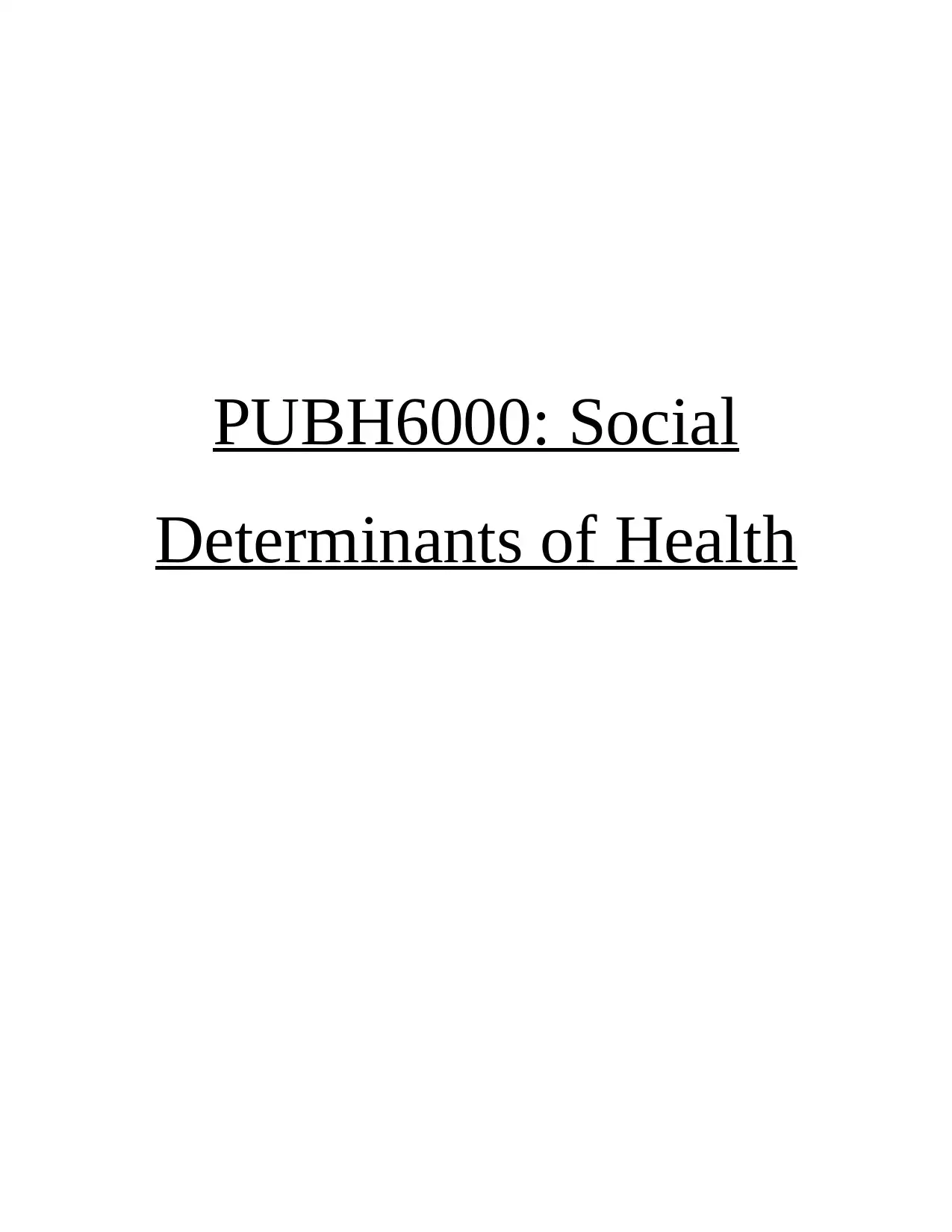
PUBH6000: Social
Determinants of Health
Determinants of Health
Paraphrase This Document
Need a fresh take? Get an instant paraphrase of this document with our AI Paraphraser
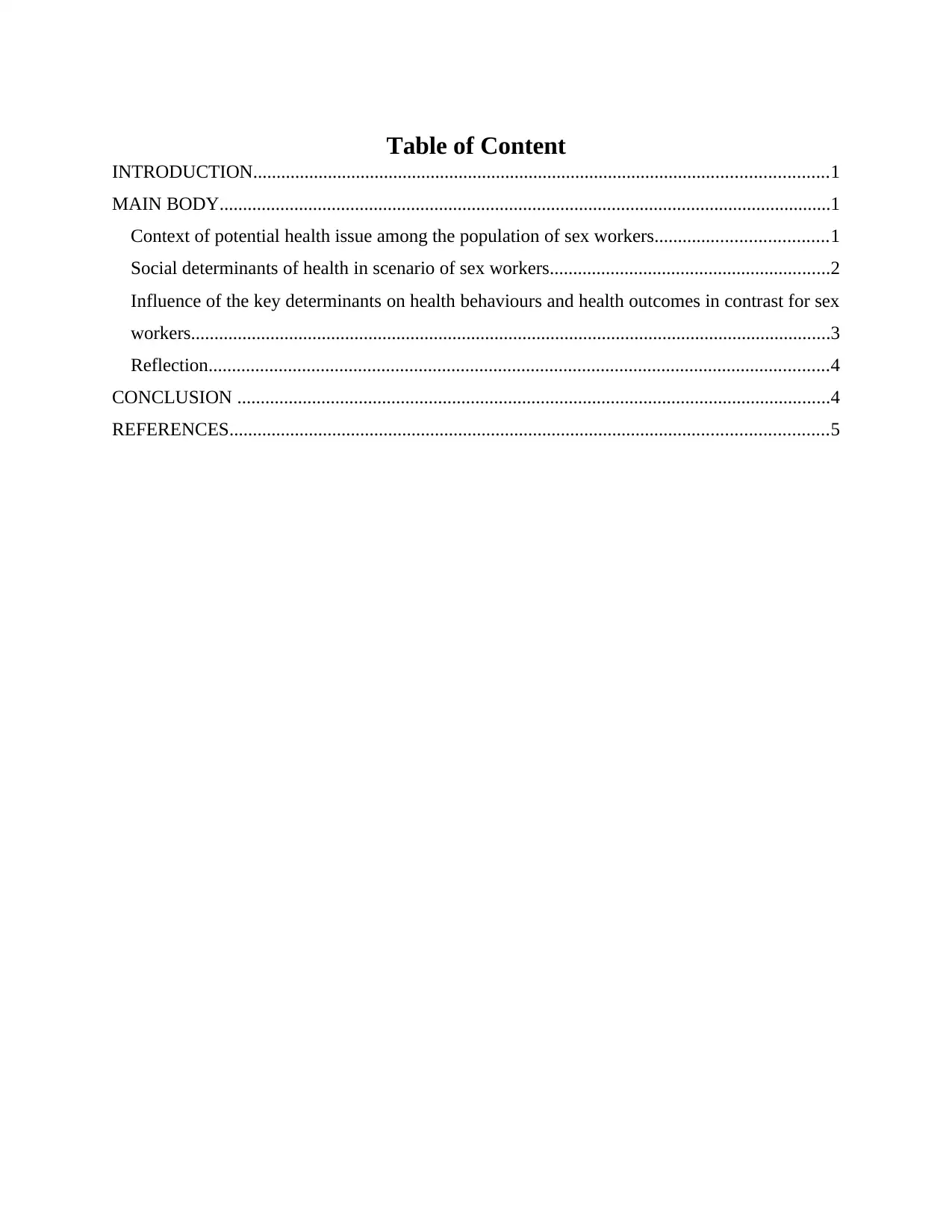
Table of Content
INTRODUCTION...........................................................................................................................1
MAIN BODY...................................................................................................................................1
Context of potential health issue among the population of sex workers.....................................1
Social determinants of health in scenario of sex workers............................................................2
Influence of the key determinants on health behaviours and health outcomes in contrast for sex
workers.........................................................................................................................................3
Reflection.....................................................................................................................................4
CONCLUSION ...............................................................................................................................4
REFERENCES................................................................................................................................5
INTRODUCTION...........................................................................................................................1
MAIN BODY...................................................................................................................................1
Context of potential health issue among the population of sex workers.....................................1
Social determinants of health in scenario of sex workers............................................................2
Influence of the key determinants on health behaviours and health outcomes in contrast for sex
workers.........................................................................................................................................3
Reflection.....................................................................................................................................4
CONCLUSION ...............................................................................................................................4
REFERENCES................................................................................................................................5
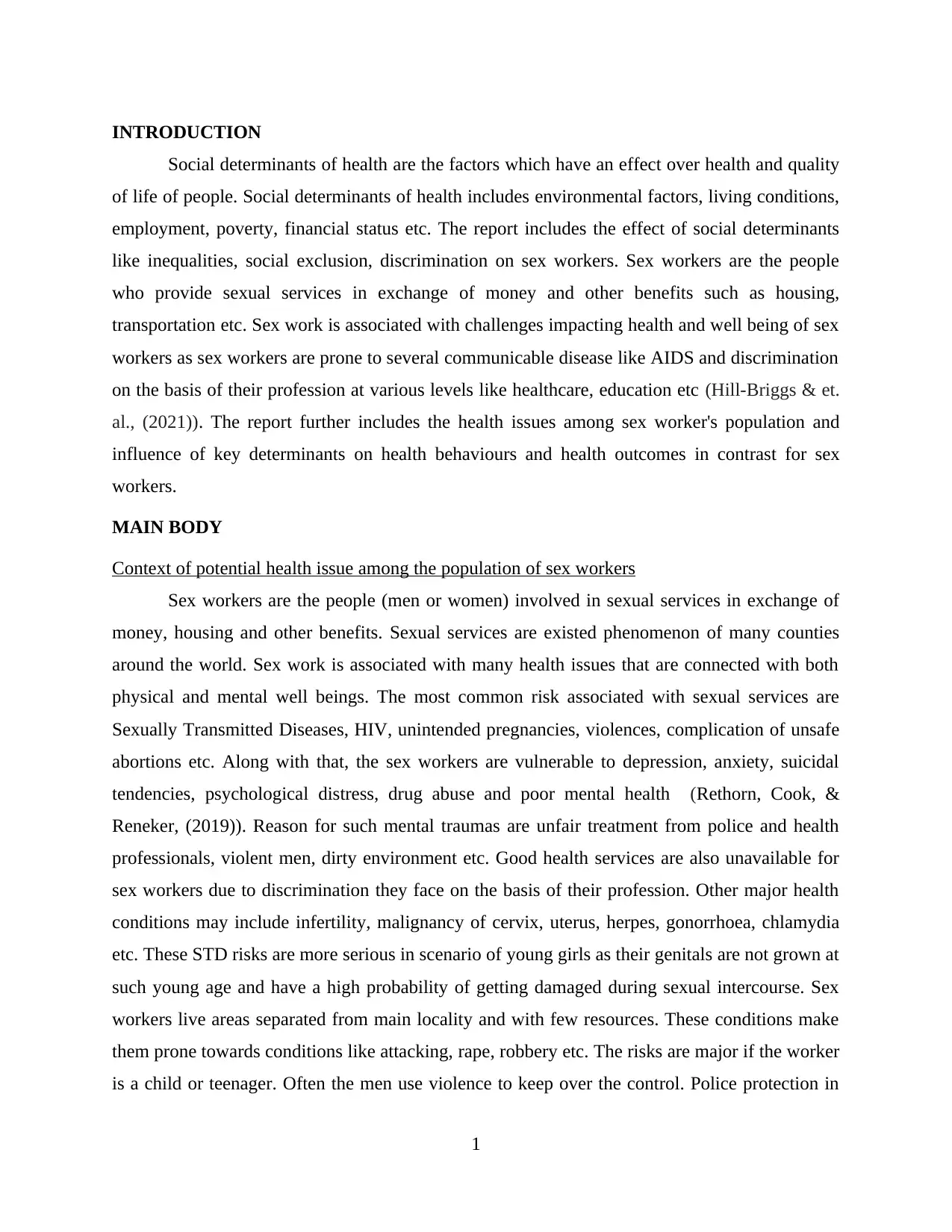
INTRODUCTION
Social determinants of health are the factors which have an effect over health and quality
of life of people. Social determinants of health includes environmental factors, living conditions,
employment, poverty, financial status etc. The report includes the effect of social determinants
like inequalities, social exclusion, discrimination on sex workers. Sex workers are the people
who provide sexual services in exchange of money and other benefits such as housing,
transportation etc. Sex work is associated with challenges impacting health and well being of sex
workers as sex workers are prone to several communicable disease like AIDS and discrimination
on the basis of their profession at various levels like healthcare, education etc (Hill-Briggs & et.
al., (2021)). The report further includes the health issues among sex worker's population and
influence of key determinants on health behaviours and health outcomes in contrast for sex
workers.
MAIN BODY
Context of potential health issue among the population of sex workers
Sex workers are the people (men or women) involved in sexual services in exchange of
money, housing and other benefits. Sexual services are existed phenomenon of many counties
around the world. Sex work is associated with many health issues that are connected with both
physical and mental well beings. The most common risk associated with sexual services are
Sexually Transmitted Diseases, HIV, unintended pregnancies, violences, complication of unsafe
abortions etc. Along with that, the sex workers are vulnerable to depression, anxiety, suicidal
tendencies, psychological distress, drug abuse and poor mental health (Rethorn, Cook, &
Reneker, (2019)). Reason for such mental traumas are unfair treatment from police and health
professionals, violent men, dirty environment etc. Good health services are also unavailable for
sex workers due to discrimination they face on the basis of their profession. Other major health
conditions may include infertility, malignancy of cervix, uterus, herpes, gonorrhoea, chlamydia
etc. These STD risks are more serious in scenario of young girls as their genitals are not grown at
such young age and have a high probability of getting damaged during sexual intercourse. Sex
workers live areas separated from main locality and with few resources. These conditions make
them prone towards conditions like attacking, rape, robbery etc. The risks are major if the worker
is a child or teenager. Often the men use violence to keep over the control. Police protection in
1
Social determinants of health are the factors which have an effect over health and quality
of life of people. Social determinants of health includes environmental factors, living conditions,
employment, poverty, financial status etc. The report includes the effect of social determinants
like inequalities, social exclusion, discrimination on sex workers. Sex workers are the people
who provide sexual services in exchange of money and other benefits such as housing,
transportation etc. Sex work is associated with challenges impacting health and well being of sex
workers as sex workers are prone to several communicable disease like AIDS and discrimination
on the basis of their profession at various levels like healthcare, education etc (Hill-Briggs & et.
al., (2021)). The report further includes the health issues among sex worker's population and
influence of key determinants on health behaviours and health outcomes in contrast for sex
workers.
MAIN BODY
Context of potential health issue among the population of sex workers
Sex workers are the people (men or women) involved in sexual services in exchange of
money, housing and other benefits. Sexual services are existed phenomenon of many counties
around the world. Sex work is associated with many health issues that are connected with both
physical and mental well beings. The most common risk associated with sexual services are
Sexually Transmitted Diseases, HIV, unintended pregnancies, violences, complication of unsafe
abortions etc. Along with that, the sex workers are vulnerable to depression, anxiety, suicidal
tendencies, psychological distress, drug abuse and poor mental health (Rethorn, Cook, &
Reneker, (2019)). Reason for such mental traumas are unfair treatment from police and health
professionals, violent men, dirty environment etc. Good health services are also unavailable for
sex workers due to discrimination they face on the basis of their profession. Other major health
conditions may include infertility, malignancy of cervix, uterus, herpes, gonorrhoea, chlamydia
etc. These STD risks are more serious in scenario of young girls as their genitals are not grown at
such young age and have a high probability of getting damaged during sexual intercourse. Sex
workers live areas separated from main locality and with few resources. These conditions make
them prone towards conditions like attacking, rape, robbery etc. The risks are major if the worker
is a child or teenager. Often the men use violence to keep over the control. Police protection in
1
⊘ This is a preview!⊘
Do you want full access?
Subscribe today to unlock all pages.

Trusted by 1+ million students worldwide
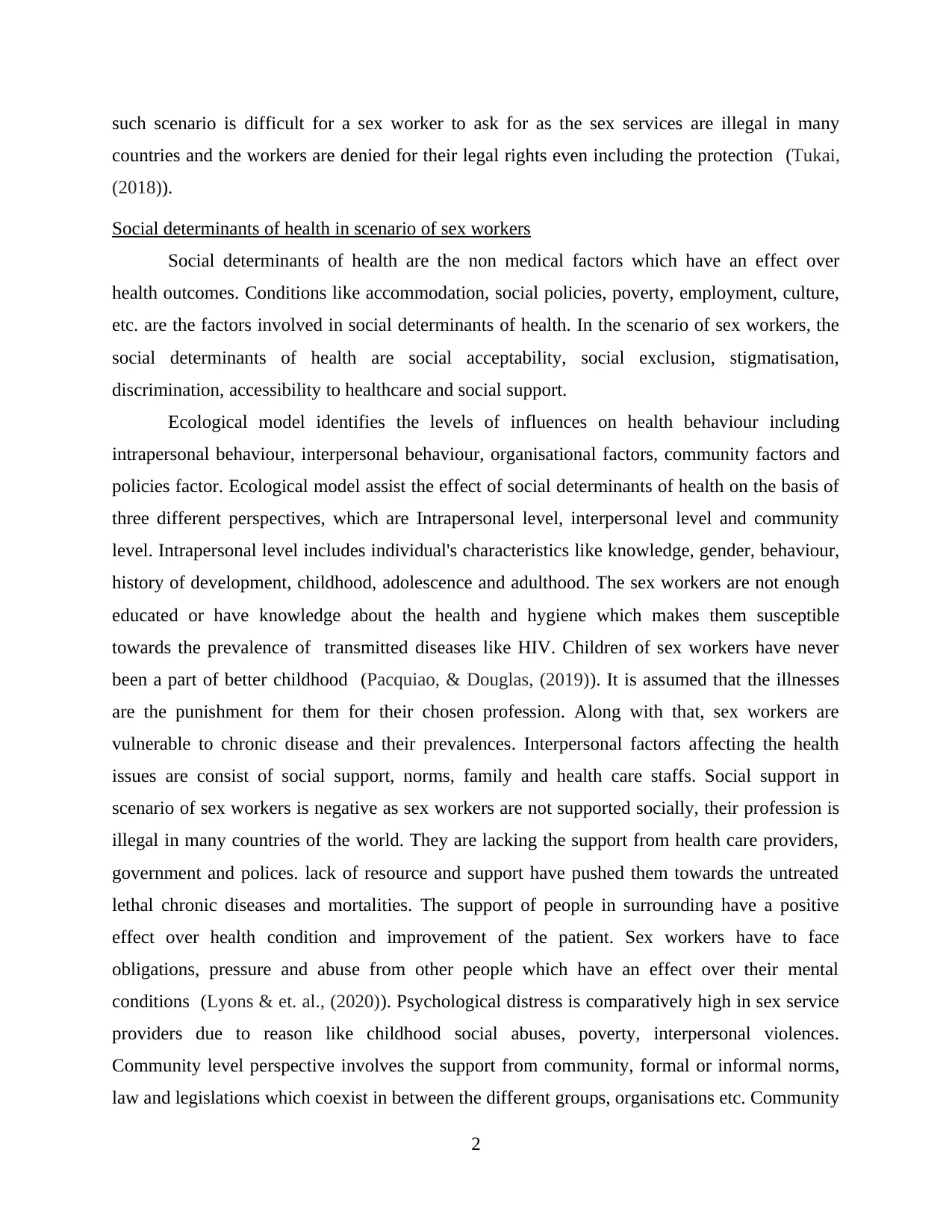
such scenario is difficult for a sex worker to ask for as the sex services are illegal in many
countries and the workers are denied for their legal rights even including the protection (Tukai,
(2018)).
Social determinants of health in scenario of sex workers
Social determinants of health are the non medical factors which have an effect over
health outcomes. Conditions like accommodation, social policies, poverty, employment, culture,
etc. are the factors involved in social determinants of health. In the scenario of sex workers, the
social determinants of health are social acceptability, social exclusion, stigmatisation,
discrimination, accessibility to healthcare and social support.
Ecological model identifies the levels of influences on health behaviour including
intrapersonal behaviour, interpersonal behaviour, organisational factors, community factors and
policies factor. Ecological model assist the effect of social determinants of health on the basis of
three different perspectives, which are Intrapersonal level, interpersonal level and community
level. Intrapersonal level includes individual's characteristics like knowledge, gender, behaviour,
history of development, childhood, adolescence and adulthood. The sex workers are not enough
educated or have knowledge about the health and hygiene which makes them susceptible
towards the prevalence of transmitted diseases like HIV. Children of sex workers have never
been a part of better childhood (Pacquiao, & Douglas, (2019)). It is assumed that the illnesses
are the punishment for them for their chosen profession. Along with that, sex workers are
vulnerable to chronic disease and their prevalences. Interpersonal factors affecting the health
issues are consist of social support, norms, family and health care staffs. Social support in
scenario of sex workers is negative as sex workers are not supported socially, their profession is
illegal in many countries of the world. They are lacking the support from health care providers,
government and polices. lack of resource and support have pushed them towards the untreated
lethal chronic diseases and mortalities. The support of people in surrounding have a positive
effect over health condition and improvement of the patient. Sex workers have to face
obligations, pressure and abuse from other people which have an effect over their mental
conditions (Lyons & et. al., (2020)). Psychological distress is comparatively high in sex service
providers due to reason like childhood social abuses, poverty, interpersonal violences.
Community level perspective involves the support from community, formal or informal norms,
law and legislations which coexist in between the different groups, organisations etc. Community
2
countries and the workers are denied for their legal rights even including the protection (Tukai,
(2018)).
Social determinants of health in scenario of sex workers
Social determinants of health are the non medical factors which have an effect over
health outcomes. Conditions like accommodation, social policies, poverty, employment, culture,
etc. are the factors involved in social determinants of health. In the scenario of sex workers, the
social determinants of health are social acceptability, social exclusion, stigmatisation,
discrimination, accessibility to healthcare and social support.
Ecological model identifies the levels of influences on health behaviour including
intrapersonal behaviour, interpersonal behaviour, organisational factors, community factors and
policies factor. Ecological model assist the effect of social determinants of health on the basis of
three different perspectives, which are Intrapersonal level, interpersonal level and community
level. Intrapersonal level includes individual's characteristics like knowledge, gender, behaviour,
history of development, childhood, adolescence and adulthood. The sex workers are not enough
educated or have knowledge about the health and hygiene which makes them susceptible
towards the prevalence of transmitted diseases like HIV. Children of sex workers have never
been a part of better childhood (Pacquiao, & Douglas, (2019)). It is assumed that the illnesses
are the punishment for them for their chosen profession. Along with that, sex workers are
vulnerable to chronic disease and their prevalences. Interpersonal factors affecting the health
issues are consist of social support, norms, family and health care staffs. Social support in
scenario of sex workers is negative as sex workers are not supported socially, their profession is
illegal in many countries of the world. They are lacking the support from health care providers,
government and polices. lack of resource and support have pushed them towards the untreated
lethal chronic diseases and mortalities. The support of people in surrounding have a positive
effect over health condition and improvement of the patient. Sex workers have to face
obligations, pressure and abuse from other people which have an effect over their mental
conditions (Lyons & et. al., (2020)). Psychological distress is comparatively high in sex service
providers due to reason like childhood social abuses, poverty, interpersonal violences.
Community level perspective involves the support from community, formal or informal norms,
law and legislations which coexist in between the different groups, organisations etc. Community
2
Paraphrase This Document
Need a fresh take? Get an instant paraphrase of this document with our AI Paraphraser
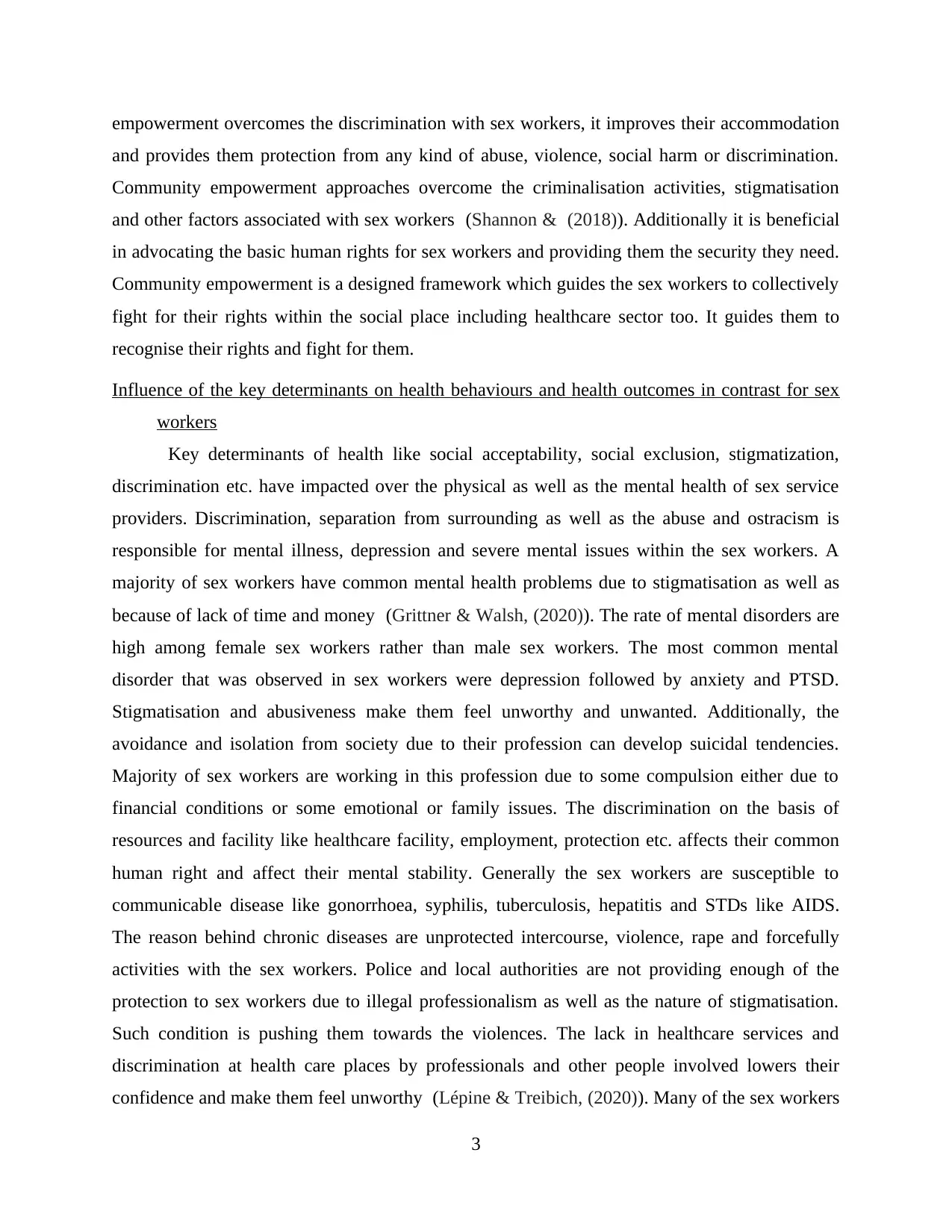
empowerment overcomes the discrimination with sex workers, it improves their accommodation
and provides them protection from any kind of abuse, violence, social harm or discrimination.
Community empowerment approaches overcome the criminalisation activities, stigmatisation
and other factors associated with sex workers (Shannon & (2018)). Additionally it is beneficial
in advocating the basic human rights for sex workers and providing them the security they need.
Community empowerment is a designed framework which guides the sex workers to collectively
fight for their rights within the social place including healthcare sector too. It guides them to
recognise their rights and fight for them.
Influence of the key determinants on health behaviours and health outcomes in contrast for sex
workers
Key determinants of health like social acceptability, social exclusion, stigmatization,
discrimination etc. have impacted over the physical as well as the mental health of sex service
providers. Discrimination, separation from surrounding as well as the abuse and ostracism is
responsible for mental illness, depression and severe mental issues within the sex workers. A
majority of sex workers have common mental health problems due to stigmatisation as well as
because of lack of time and money (Grittner & Walsh, (2020)). The rate of mental disorders are
high among female sex workers rather than male sex workers. The most common mental
disorder that was observed in sex workers were depression followed by anxiety and PTSD.
Stigmatisation and abusiveness make them feel unworthy and unwanted. Additionally, the
avoidance and isolation from society due to their profession can develop suicidal tendencies.
Majority of sex workers are working in this profession due to some compulsion either due to
financial conditions or some emotional or family issues. The discrimination on the basis of
resources and facility like healthcare facility, employment, protection etc. affects their common
human right and affect their mental stability. Generally the sex workers are susceptible to
communicable disease like gonorrhoea, syphilis, tuberculosis, hepatitis and STDs like AIDS.
The reason behind chronic diseases are unprotected intercourse, violence, rape and forcefully
activities with the sex workers. Police and local authorities are not providing enough of the
protection to sex workers due to illegal professionalism as well as the nature of stigmatisation.
Such condition is pushing them towards the violences. The lack in healthcare services and
discrimination at health care places by professionals and other people involved lowers their
confidence and make them feel unworthy (Lépine & Treibich, (2020)). Many of the sex workers
3
and provides them protection from any kind of abuse, violence, social harm or discrimination.
Community empowerment approaches overcome the criminalisation activities, stigmatisation
and other factors associated with sex workers (Shannon & (2018)). Additionally it is beneficial
in advocating the basic human rights for sex workers and providing them the security they need.
Community empowerment is a designed framework which guides the sex workers to collectively
fight for their rights within the social place including healthcare sector too. It guides them to
recognise their rights and fight for them.
Influence of the key determinants on health behaviours and health outcomes in contrast for sex
workers
Key determinants of health like social acceptability, social exclusion, stigmatization,
discrimination etc. have impacted over the physical as well as the mental health of sex service
providers. Discrimination, separation from surrounding as well as the abuse and ostracism is
responsible for mental illness, depression and severe mental issues within the sex workers. A
majority of sex workers have common mental health problems due to stigmatisation as well as
because of lack of time and money (Grittner & Walsh, (2020)). The rate of mental disorders are
high among female sex workers rather than male sex workers. The most common mental
disorder that was observed in sex workers were depression followed by anxiety and PTSD.
Stigmatisation and abusiveness make them feel unworthy and unwanted. Additionally, the
avoidance and isolation from society due to their profession can develop suicidal tendencies.
Majority of sex workers are working in this profession due to some compulsion either due to
financial conditions or some emotional or family issues. The discrimination on the basis of
resources and facility like healthcare facility, employment, protection etc. affects their common
human right and affect their mental stability. Generally the sex workers are susceptible to
communicable disease like gonorrhoea, syphilis, tuberculosis, hepatitis and STDs like AIDS.
The reason behind chronic diseases are unprotected intercourse, violence, rape and forcefully
activities with the sex workers. Police and local authorities are not providing enough of the
protection to sex workers due to illegal professionalism as well as the nature of stigmatisation.
Such condition is pushing them towards the violences. The lack in healthcare services and
discrimination at health care places by professionals and other people involved lowers their
confidence and make them feel unworthy (Lépine & Treibich, (2020)). Many of the sex workers
3
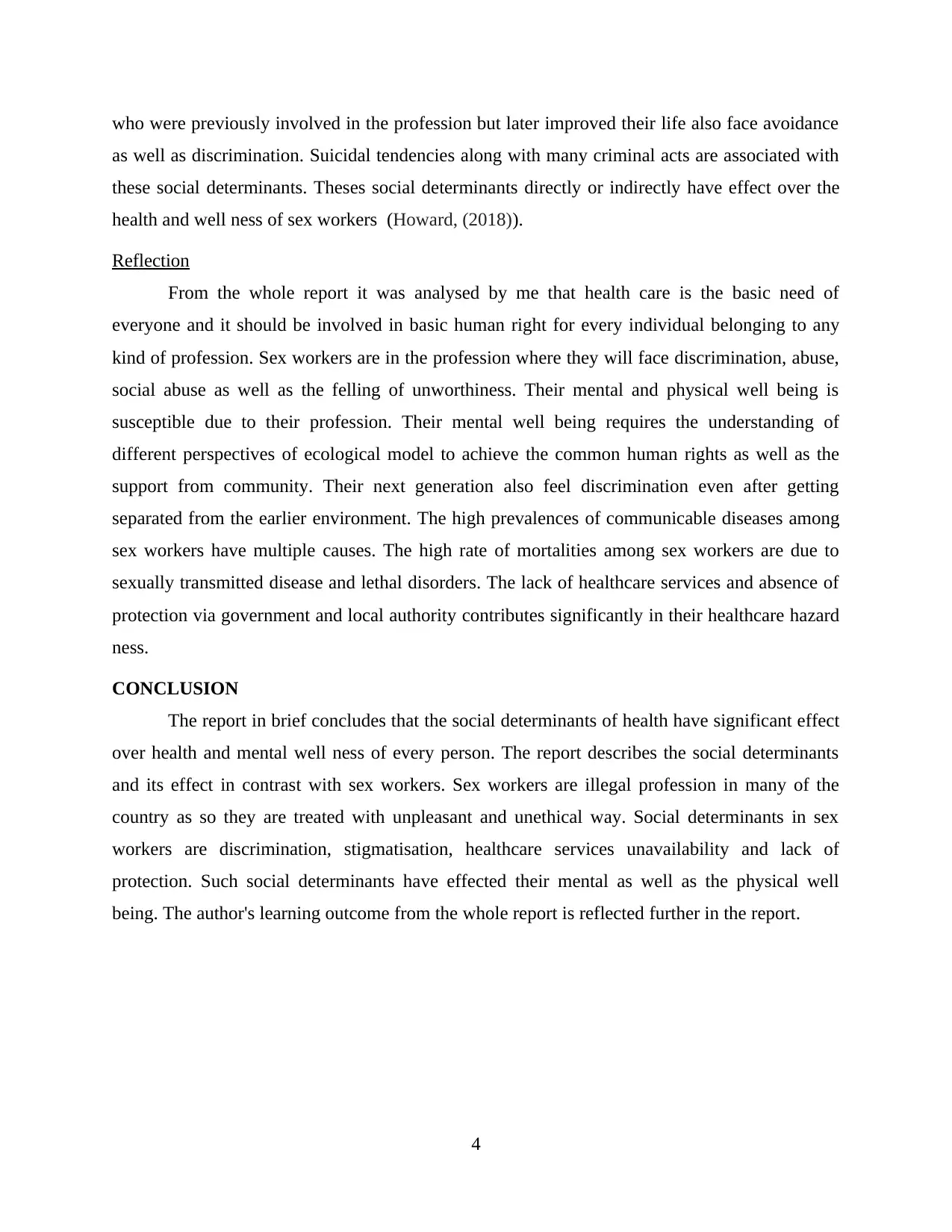
who were previously involved in the profession but later improved their life also face avoidance
as well as discrimination. Suicidal tendencies along with many criminal acts are associated with
these social determinants. Theses social determinants directly or indirectly have effect over the
health and well ness of sex workers (Howard, (2018)).
Reflection
From the whole report it was analysed by me that health care is the basic need of
everyone and it should be involved in basic human right for every individual belonging to any
kind of profession. Sex workers are in the profession where they will face discrimination, abuse,
social abuse as well as the felling of unworthiness. Their mental and physical well being is
susceptible due to their profession. Their mental well being requires the understanding of
different perspectives of ecological model to achieve the common human rights as well as the
support from community. Their next generation also feel discrimination even after getting
separated from the earlier environment. The high prevalences of communicable diseases among
sex workers have multiple causes. The high rate of mortalities among sex workers are due to
sexually transmitted disease and lethal disorders. The lack of healthcare services and absence of
protection via government and local authority contributes significantly in their healthcare hazard
ness.
CONCLUSION
The report in brief concludes that the social determinants of health have significant effect
over health and mental well ness of every person. The report describes the social determinants
and its effect in contrast with sex workers. Sex workers are illegal profession in many of the
country as so they are treated with unpleasant and unethical way. Social determinants in sex
workers are discrimination, stigmatisation, healthcare services unavailability and lack of
protection. Such social determinants have effected their mental as well as the physical well
being. The author's learning outcome from the whole report is reflected further in the report.
4
as well as discrimination. Suicidal tendencies along with many criminal acts are associated with
these social determinants. Theses social determinants directly or indirectly have effect over the
health and well ness of sex workers (Howard, (2018)).
Reflection
From the whole report it was analysed by me that health care is the basic need of
everyone and it should be involved in basic human right for every individual belonging to any
kind of profession. Sex workers are in the profession where they will face discrimination, abuse,
social abuse as well as the felling of unworthiness. Their mental and physical well being is
susceptible due to their profession. Their mental well being requires the understanding of
different perspectives of ecological model to achieve the common human rights as well as the
support from community. Their next generation also feel discrimination even after getting
separated from the earlier environment. The high prevalences of communicable diseases among
sex workers have multiple causes. The high rate of mortalities among sex workers are due to
sexually transmitted disease and lethal disorders. The lack of healthcare services and absence of
protection via government and local authority contributes significantly in their healthcare hazard
ness.
CONCLUSION
The report in brief concludes that the social determinants of health have significant effect
over health and mental well ness of every person. The report describes the social determinants
and its effect in contrast with sex workers. Sex workers are illegal profession in many of the
country as so they are treated with unpleasant and unethical way. Social determinants in sex
workers are discrimination, stigmatisation, healthcare services unavailability and lack of
protection. Such social determinants have effected their mental as well as the physical well
being. The author's learning outcome from the whole report is reflected further in the report.
4
⊘ This is a preview!⊘
Do you want full access?
Subscribe today to unlock all pages.

Trusted by 1+ million students worldwide
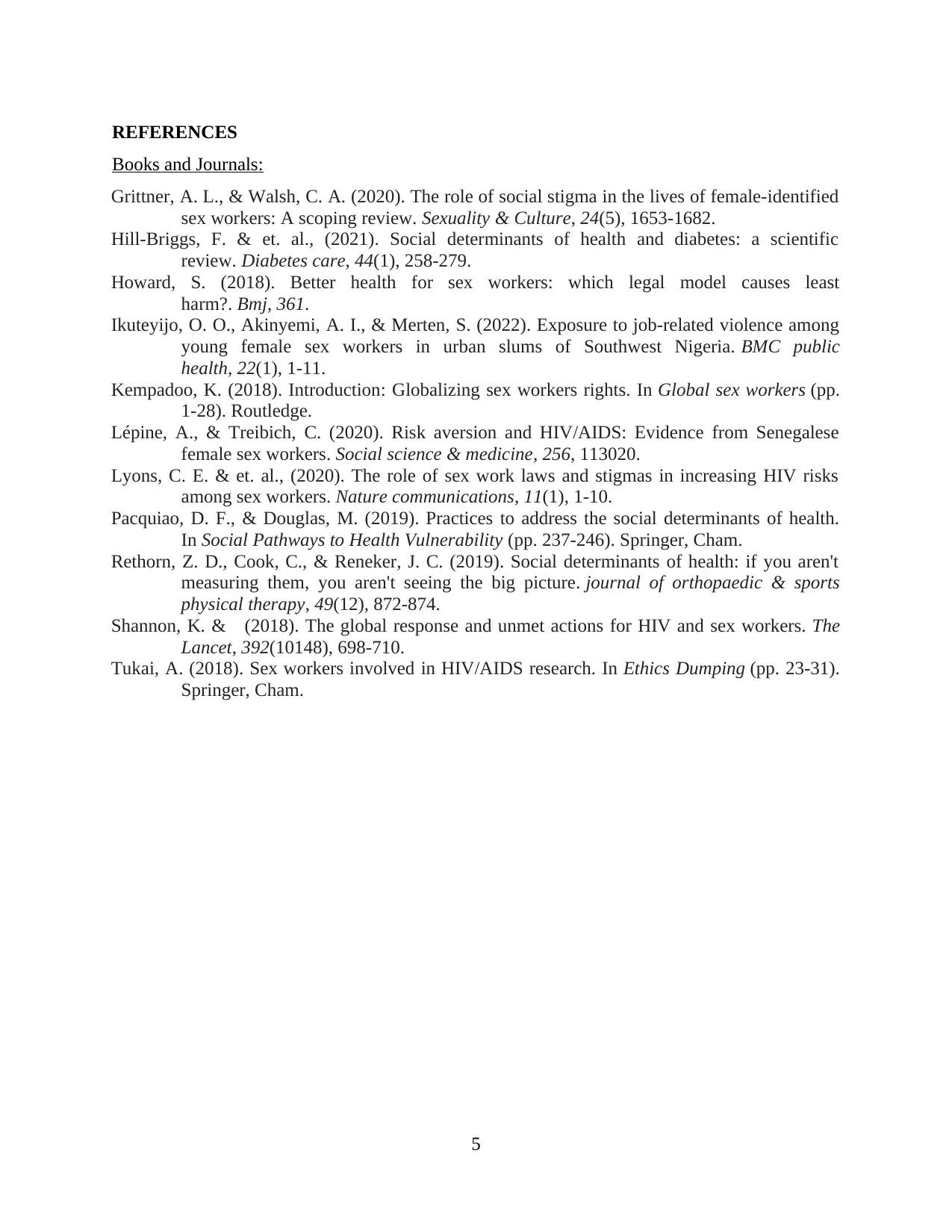
REFERENCES
Books and Journals:
Grittner, A. L., & Walsh, C. A. (2020). The role of social stigma in the lives of female-identified
sex workers: A scoping review. Sexuality & Culture, 24(5), 1653-1682.
Hill-Briggs, F. & et. al., (2021). Social determinants of health and diabetes: a scientific
review. Diabetes care, 44(1), 258-279.
Howard, S. (2018). Better health for sex workers: which legal model causes least
harm?. Bmj, 361.
Ikuteyijo, O. O., Akinyemi, A. I., & Merten, S. (2022). Exposure to job-related violence among
young female sex workers in urban slums of Southwest Nigeria. BMC public
health, 22(1), 1-11.
Kempadoo, K. (2018). Introduction: Globalizing sex workers rights. In Global sex workers (pp.
1-28). Routledge.
Lépine, A., & Treibich, C. (2020). Risk aversion and HIV/AIDS: Evidence from Senegalese
female sex workers. Social science & medicine, 256, 113020.
Lyons, C. E. & et. al., (2020). The role of sex work laws and stigmas in increasing HIV risks
among sex workers. Nature communications, 11(1), 1-10.
Pacquiao, D. F., & Douglas, M. (2019). Practices to address the social determinants of health.
In Social Pathways to Health Vulnerability (pp. 237-246). Springer, Cham.
Rethorn, Z. D., Cook, C., & Reneker, J. C. (2019). Social determinants of health: if you aren't
measuring them, you aren't seeing the big picture. journal of orthopaedic & sports
physical therapy, 49(12), 872-874.
Shannon, K. & (2018). The global response and unmet actions for HIV and sex workers. The
Lancet, 392(10148), 698-710.
Tukai, A. (2018). Sex workers involved in HIV/AIDS research. In Ethics Dumping (pp. 23-31).
Springer, Cham.
5
Books and Journals:
Grittner, A. L., & Walsh, C. A. (2020). The role of social stigma in the lives of female-identified
sex workers: A scoping review. Sexuality & Culture, 24(5), 1653-1682.
Hill-Briggs, F. & et. al., (2021). Social determinants of health and diabetes: a scientific
review. Diabetes care, 44(1), 258-279.
Howard, S. (2018). Better health for sex workers: which legal model causes least
harm?. Bmj, 361.
Ikuteyijo, O. O., Akinyemi, A. I., & Merten, S. (2022). Exposure to job-related violence among
young female sex workers in urban slums of Southwest Nigeria. BMC public
health, 22(1), 1-11.
Kempadoo, K. (2018). Introduction: Globalizing sex workers rights. In Global sex workers (pp.
1-28). Routledge.
Lépine, A., & Treibich, C. (2020). Risk aversion and HIV/AIDS: Evidence from Senegalese
female sex workers. Social science & medicine, 256, 113020.
Lyons, C. E. & et. al., (2020). The role of sex work laws and stigmas in increasing HIV risks
among sex workers. Nature communications, 11(1), 1-10.
Pacquiao, D. F., & Douglas, M. (2019). Practices to address the social determinants of health.
In Social Pathways to Health Vulnerability (pp. 237-246). Springer, Cham.
Rethorn, Z. D., Cook, C., & Reneker, J. C. (2019). Social determinants of health: if you aren't
measuring them, you aren't seeing the big picture. journal of orthopaedic & sports
physical therapy, 49(12), 872-874.
Shannon, K. & (2018). The global response and unmet actions for HIV and sex workers. The
Lancet, 392(10148), 698-710.
Tukai, A. (2018). Sex workers involved in HIV/AIDS research. In Ethics Dumping (pp. 23-31).
Springer, Cham.
5
1 out of 7
Related Documents
Your All-in-One AI-Powered Toolkit for Academic Success.
+13062052269
info@desklib.com
Available 24*7 on WhatsApp / Email
![[object Object]](/_next/static/media/star-bottom.7253800d.svg)
Unlock your academic potential
Copyright © 2020–2025 A2Z Services. All Rights Reserved. Developed and managed by ZUCOL.





